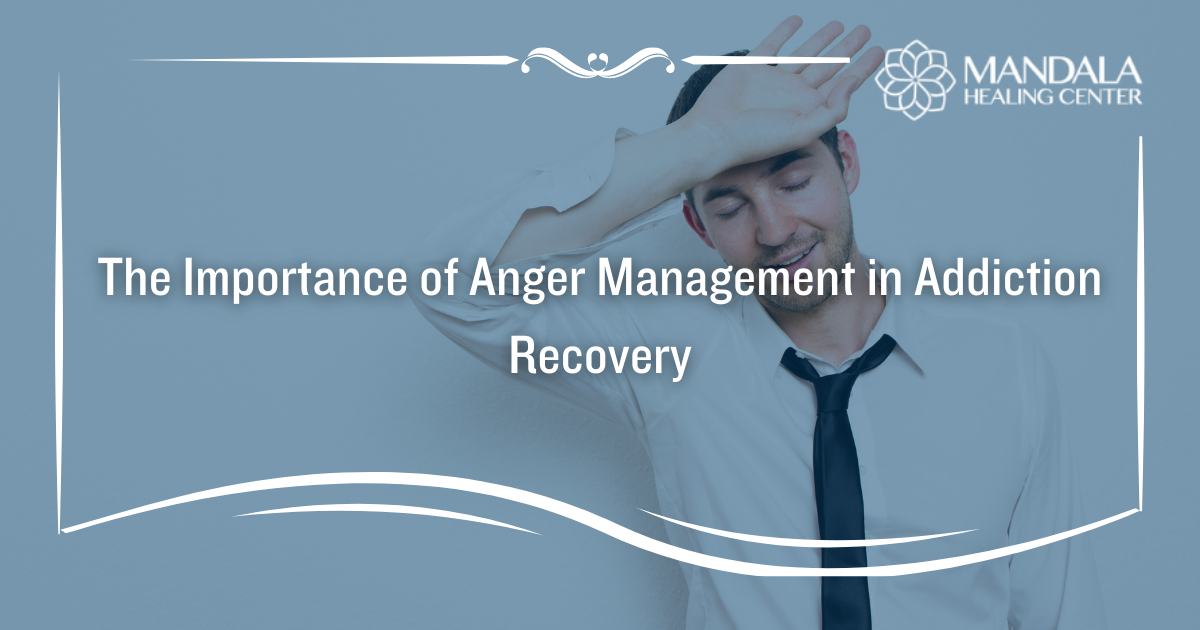Millions of people in the United States live with substance abuse and addiction. Each person has their own life experiences that lead to addiction, but many end up facing the same consequences. These can include serious harm to their mental and physical wellbeing, relationship stress, and life-altering legal or financial trouble.
With the right support and treatment, people can recover from addiction and lead the healthy, fulfilling life they deserve. High-quality, comprehensive addiction treatment doesn’t simply address the physical aspects of addiction. Instead, it gives people the support and education they need to identify the causes of their addiction and the skills to avoid relapse in the future.
Some people who live with addiction also have trouble managing their anger. Anger can lead to destruction, impulsive decisions, or depression. Without learning how to manage their anger, people struggle to fully recover from addiction and move forward in their life.
By incorporating anger management into addiction treatment, individuals can get the comprehensive support they need to recover.
At the Mandala Healing Center, we know that addiction affects the whole self. Our treatment programs are designed to allow people to experience whole-person healing: body, mind, and spirit. If you or someone you love is living with substance abuse or addiction, you are not alone. Reach out to our caring staff for information about how we can support your recovery.
Whole-Person Healing: The Importance of Anger Management and Addiction Treatment
For some, anger and addiction are part of a cycle that creates ever-increasing negative consequences. A person’s anger may lead them to abuse substances. Their substance abuse lowers their ability to use healthy coping mechanisms to manage their anger and their stress levels rise, leading to more anger. They may continue or increase their substance use to manage their rising stress and anger.
This anger and addiction cycle can cause serious problems. In some cases, a person’s anger or rage can lead them to start using substances as a way to manage their emotional turmoil. In other cases, substance abuse causes them to develop a rage or anger problem. Other times, the person’s choice of substances causes anxiety or anger. This is especially true with alcohol, cocaine, and other stimulants.
Regardless of whether their anger issues or substance abuse comes first, people with anger management and addiction are prone to serious consequences that can cause stress, including strain in their relationships, job loss, and financial or legal trouble.
How Anger Management Fits Into Addiction Treatment
In comprehensive addiction treatment programs, people receive a combination of evidence-based and holistic therapies that can help them identify the roots of their addiction and heal their whole self. Addiction treatment happens in stages.
Detox
People are monitored and treated for the uncomfortable or dangerous symptoms of withdrawal. The support from staff and the distance they have from their triggers makes it more likely that they will have a safe, complete detox.
Treatment
After a successful detox program, people can begin treatment. During treatment, people engage in a variety of therapies and activities that can help them overcome addiction and learn how to prevent relapse in the future. These activities include:
- Individual therapy
- Group counseling
- Education
- Medication management
- Medical and mental health treatment, if necessary
- Family therapy
- Holistic therapies–yoga, mindfulness, art, recreation, nutrition, and other healing treatments
People who need anger management and addiction treatment may work through their issues during group and individual therapy. They may also learn holistic stress and anger management techniques.
Anger Management and Addiction Treatment: The Methods
Learning to cope with anger and stress is a key factor in many treatment programs. There are many techniques people learn to help them manage anger.
Exercise
Research shows that people who engage in regular exercise are better at managing their anger and coping with stress.[1] People do not need to hit the gym for hours or train for a marathon to reap the rewards–as little as 20 minutes of moderate movement each day can be helpful.
Meditation and mindfulness
Meditation and mindfulness have become more popular in recent years. Meditation doesn’t have to mean sitting still for hours. Instead, it can mean using special breathing techniques that can help you feel calmer or learning to stay in the present moment when faced with stress and challenges.[2]
Creativity
Some people find that having a creative outlet can help them feel better overall, including having less stress and anger. Painting, drawing, photography, dance, singing, writing, or other forms of creative expression can all be incorporated into treatment and life in recovery to help manage stress.
Support
Addiction can feel lonely, and people in recovery often require more support. This can come from supportive friends and family, others in recovery, or professional counselors. Getting support is a good way to prevent loneliness, anger, and stress. During treatment, people will begin to expand their social support network so that they will be properly supported during recovery.
People can begin some of these anger management practices during addiction treatment and continue them in recovery. The techniques they learn and practice in treatment can benefit them for the rest of their lives.
Learn More About Starting Addiction Treatment at the Mandala Healing Center
If you or someone you love needs addiction treatment or support during recovery, reach out to the caring staff at the Mandala Healing Center. We offer a variety of holistic, adaptable treatment programs that can help you overcome addiction.
Don’t wait another day for the treatment you need and deserve. Call today to get started.
References:












